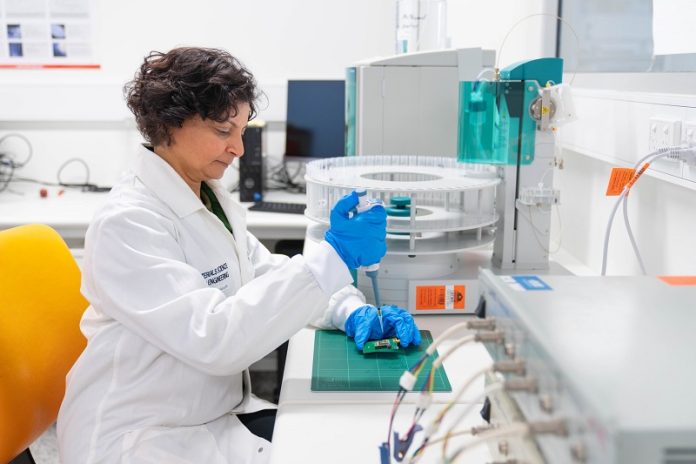
Doctors may soon be able to screen for Alzheimer’s Disease (AD) with a simple finger-prick blood test, thanks to a breakthrough by engineers at Monash University.
This new test, which is about the size of a credit card, uses advanced sensor technology to detect early signs of Alzheimer’s before symptoms become severe.
The test works by identifying tiny amounts of specific protein biomarkers in the blood, which are linked to Alzheimer’s.
This “needle-in-a-haystack” precision allows the test to find these disease markers quickly—within minutes.
This technology, which doesn’t require a laboratory, could give general practitioners (GPs) an easy and non-invasive way to screen patients for Alzheimer’s right in their offices.
With dementia diagnoses in Australia expected to double by 2054, this quick and affordable test could become a crucial tool for early detection.
Early diagnosis is important because it can lead to better management of the disease and could slow down the progression of symptoms.
Associate Professor Sudha Mokkapati from Monash’s Materials Science and Engineering department led the development of this new sensor technology.
She explained that the device is designed to be simple to use, low-cost, and portable, making it accessible to many doctors.
“Detecting the disease early in large populations could dramatically change the course of this disease for many patients and save millions in healthcare costs,” she said.
The team has already completed initial testing, showing that the technology can accurately detect very low levels of the disease biomarkers in the blood. The next step is to conduct clinical trials to validate the device for use in real-world settings.
However, further funding is needed to move forward with these trials.
Associate Professor Matthew Pase, from Monash’s School of Psychological Sciences, highlighted the importance of early detection.
He noted that most patients with neurodegenerative diseases like Alzheimer’s are diagnosed at advanced stages when treatments are less effective.
“Earlier screening could improve the outlook for many patients by increasing the chances of halting or slowing the development of symptoms,” Pase said.
In summary, this new finger-prick test developed by Monash engineers offers a promising and accessible way to detect Alzheimer’s Disease early, which could lead to better outcomes for patients and help reduce the overall burden on the healthcare system.
If you care about Alzheimer’s disease, please read studies about vitamin D deficiency linked to Alzheimer’s and dementia, and strawberries can be good defence against Alzheimer’s.
For more health information, please see recent studies about foods that reduce Alzheimer’s risk, and oral cannabis extract may help reduce Alzheimer’s symptoms.



